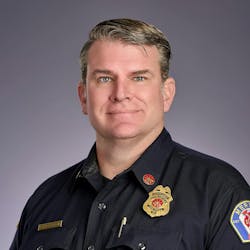Albert Einstein was one of the most influential thinkers of modern times. His name alone is synonymous with genius. What does this have to do with the fire service? After all, fire service leaders aren’t trying to solve theories that are related to the space-time continuum. However, there’s much for us to learn from how Einstein solved complex problems. Most of his challenges didn’t have E = mc2 answers, and neither do ours. Leaders in the fire service can consider several of Einstein’s cognitive and personal breakthroughs—learning through failure, letting one’s mind wander and prioritizing relationships—as methods to improve their own problem-solving ability.
Learning by doing
Einstein wasn’t an overly engaged student growing up. Often absent from class, he worked through difficult math equations at his own pace. He learned best by performing the work. This learning style mirrors that of fire service leaders: Most do their best learning through years of hands-on fire and EMS experience, not necessarily classroom attendance. They develop resilience, collaboration, perseverance and other skills through the successes and failures of lived experience.
For Einstein, the path that he traveled to knowledge wasn’t linear. Solutions often were achieved through the practice of trying, not quite getting it right, and trying again. For many fire service leaders, the list of not getting it right the first time is much longer than the list of getting it right the first time. Such leaders can undermine their value when they focus on failure as a weakness instead of as a learning opportunity. Fire service leaders never truly fail when the experience teaches them a lesson. It’s a necessary milestone in their journey toward a solution.
Let your mind wander
Einstein was no stranger to ambiguous and complex problems. He noticed a pattern between problem-solving and intentional mind wandering, so he sought out quiet, meditative settings to give his mind time to wander.
Often, the best ideas come to fire service leaders at the most random times. They might be taking a shower or driving to work when the answer to a challenging problem suddenly materializes.
Fire service leaders typically have a lot on their mind. Remember to seek quiet settings away from work when faced with complex problems that don’t need an immediate solution. Take a drive or a walk and ponder something outside of the complex problem that you face. You might be surprised how the solutions to complex problems formulate by letting your mind wander.
Seek critical feedback
Einstein attributed much of his success to the valuable relationships that he built. He often engaged with other physicists, even those who disagreed with his work.
Talking through challenges and ideas aloud with peers as a sounding board, purposefully engaging others who have different views, and being open to the challenge of your own views create opportunities to reveal blind spots in your assumptions.
It isn’t uncommon for a fireground incident commander to establish an action plan from the Alpha side of the building and begin to implement resource allocation and assignments only to have an update from the Charlie side that provides new information, resulting in a change of the original plan—in other words, a blind spot that’s pointed out prompts a change in course.
Talking through challenges with others and allowing their input, feedback and even suggestions can be very beneficial. It’s tempting—and even comforting—to surround yourself with people who think as you do and never challenge your ideas. However, the resulting echo chamber can prevent you and your department from experiencing growth and improvements.
Complex & elusive
Embrace the times that you can let your mind wander. Focus on meaningful relationships, particularly with those who think differently than you do. Develop these skills and you’ll be on the path to cultivate the genius that’s within.
About the Author

Charlie Butterfield
Charlie Butterfield is a deputy chief with the Meridian, ID, Fire Department. He has 28 years of fire service experience, is a graduate of the National Fire Academy’s Executive Fire Officer Program and is a designated Chief Fire Officer by the Center for Public Safety Excellence. Butterfield holds a master’s degree in education from Colorado State University. He represents the state of Idaho on the board of the Western Fire Chiefs Association and is an adjunct faculty professor for Idaho State University, where he instructs courses on fire administration.
